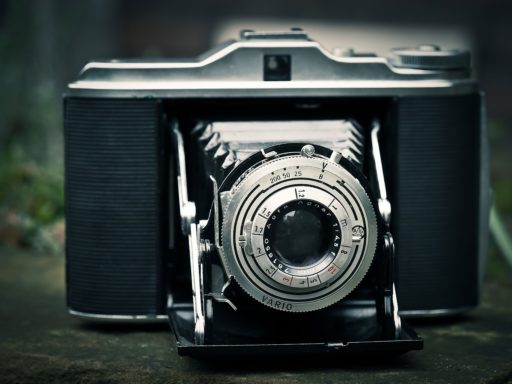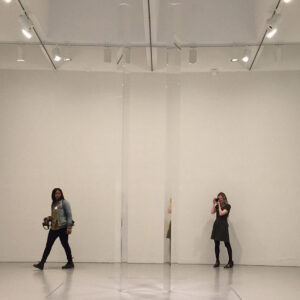I first became aware of the photographs of Deana Lawson because of a piece that Zadie Smith wrote about Lawson in The New Yorker a few years ago and I remember it being quite a good piece, which is not unusual for a piece by Zadie Smith and, to be completely truthful, I find that I am often much more moved and impressed when Zadie Smith writes about visual art than I am by the novels of Zadie Smith. But perhaps I am just being bitter in saying this because in fact I should also say that I once sort of thought that I was a little bit friends with Zadie Smith since she had liked an article I’d written about a collection of her essays and we engaged in something of an ongoing email exchange and then one day I noticed that we were both scheduled to do something at a literary event, to give a talk or give a reading or whatever people do at literary events and I thought I would drop by to say hi to her and maybe have a coffee and suddenly I was in a long line of people trying to get a moment with Zadie Smith as she was sitting at a table signing books. She was surrounded by different sorts of handlers and managers and, I guess, bodyguards and when I finally got up to Zadie Smith and when she realized that she sort of knew me through an email exchange there was an awkward chit chat between the two of us mixed with some overly long pauses and it felt, I must say, like I was standing there for several hours when in fact it must have only been a couple of minutes and the whole time she looked deeply pained and sorry for me and then her handlers sort of scooted me along down the hall and I finally realized that I am not friends with Zadie Smith at all, not even a little bit, and that she lives in a world that truly and completely has nothing to do with my own. She lives in a world of real and genuine fame and I do not. She ‘knows’ hundreds of people like me and mostly she just wants them to go away. And I don’t blame her at all for that. Not one bit. During that awkward couple of minutes standing in front of her book-signing table I wanted me to go away too.
But I digress. Zadie Smith wrote wonderfully about Deana Lawson is the real point here and then, more recently, a singer and visual artist named Moses Sumney happened to pick Deana Lawson as his favorite photographer in September’s Top Ten column at Artforum and I found that Sumney’s Top Ten was, in general, especially thoughtful and open and, I don’t know how to say it exactly, but he must have mentioned two or three times that different works of art made him cry and this openness from Sumney caused me to watch a couple of his videos, one of which is a performance of the song Cut Me in a red room and that performance is something deep, something unusual and something that I watched many many times after seeing it the first time and Sumney’s interest and love for Deana Lawson started to get intertwined with my newfound interest and love for Moses Sumney and both these things reminded me of the piece that I had read about Lawson by Zadie Smith and so suddenly I was really and truly looking at this picture by Deana Lawson, a picture that Moses Sumney specifically mentioned in his Top Ten list and which is reproduced on the pages of Artforum, a picture that I have never seen in person, I might add, but which I have studied now a few times in different digital and print formats and which is called Barrington and Father and which portrays just that, a guy named Barrington and his father, both of them standing in a living room with a floral carpet and drapes and throw pillows on the couch in just such a way that if you have spent a good deal of time, as I happen to have done, although that is another story I don’t have time to tell here, but if you’ve spent a good deal of time inside the homes of a certain kind of African American family in, say South Central Los Angeles, the living room in Lawson’s picture will seem very familiar to you as will the young man Barrington, who is shirtless and bearing tattoos and who is obviously trying to look a bit tough and to convey what you might call ‘street-cred’ and his father, dressed in a purple suit and two-toned shoes, with a light purple hat in his left hand and wearing a highly designed tie and generally exuding that sense that he could be an extra in the movie Shaft (1971, of course), and I don’t mean this in a belittling way at all, simply to convey that this is his sense of style and as one looks at these two persons in the photograph for a bit longer it becomes clear that they are both involved in the difficult work of presenting themselves in such a way that they might earn a little bit of respect, that they might be taken seriously, that the world might acknowledge them as being worthy and the more one looks at the picture the more heartbreaking this realization becomes, and yes, definitely, the sense of tenderness toward these two men is heightened by the knowledge that any American must have that this kind of “take me seriously” work is especially acute, especially complex for these two Black men living in the place and time that they do but even beyond that, the brilliance of the picture is to acknowledge this particular fact of race and then, at the same time, to show us that this is the poignancy of all attempts to be seen, of all the people out there trying to be seen, to have a moment in which the gaze is returned, to be looked at and known and recognized for being simply who one is, to be cherished for being the being that one is, if but for a moment, and to be seen and to be held by eyes that see and that affirm that seeing.
Morgan Meis has a PhD in Philosophy and is a founding member of Flux Factory, an arts collective in New York. He has written for n+1, The Believer, Harper’s Magazine, The Virginia Quarterly Review and is a contributor at The New Yorker. He won the Whiting Award for non-fiction in 2013. Morgan is also an editor at 3 Quarks Daily, and a winner of a Creative Capital | Warhol Foundation Arts Writers grant. A book of Morgan’s selected essays can be found here. His new book from Slant is The Drunken Silenus. He can be reached at morganmeis@gmail.com.





